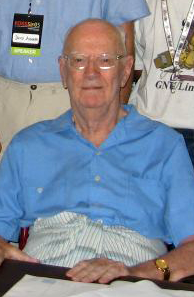In Memoriam: Arthur C. Clarke (1917 - 2008)
Technorati tags: In Memoriam, Arthur C. Clarke, 2001: A Space Odyssey, Science Fiction, Futurist, Author
"I know I've made some very poor decisions recently, but I can give you my complete assurance that my work will be back to normal. I've still got the greatest enthusiasm and confidence in the mission. And I want to help you."
(HAL9000 from 2001: A Space Odyssey)
 If Walski kept mum on the source of the quote about, one could almost imagine that it was Pak Lah who uttered these words, based on recent events... But no, what you is actually dialog from the film 2001: A Space Odyssey, based on perhaps the most well-known of Arthur C. Clarke's works.
If Walski kept mum on the source of the quote about, one could almost imagine that it was Pak Lah who uttered these words, based on recent events... But no, what you is actually dialog from the film 2001: A Space Odyssey, based on perhaps the most well-known of Arthur C. Clarke's works.
The renowned science fiction author, inventor and futurist died early this morning (approximately 4:00am, Malaysia Time) in Sri Lanka, where he'd been residing since 1956. According to this entry in Wikipedia, Clarke passed on due to respiratory problems.
Walski vaguely remembers images from 2001: A Space Odyssey, to which his mother took him to watch when he was 4+ years old, at the Pavillion cinema (way back when there was a Pavillion cinema at the end of Jalan Bukit Bintang). Watching the film again, many years later, what amazed Walski, apart from the superb special effects (this was a 1968 film, mind you), was the imagination of Clarke brought to life, in collaboration with the late Stanley Kubrick.
Some of the things portrayed in the film would probably be taken for granted today: the geosynchronous satellite, space shuttle, intelligent machines... but for 1968, it was the stuff that fueled the imagination of Walski's generation.
(visions of a better future, and more, in the full post)
Walski has to admit that apart from the Space Odyssey series of books, Walski has not read much of Arthur C. Clarke. From reading up on Clarke's long career, it would appear that his vision of the "future", as Clarke saw it, revolve around how technological breakthroughs would become enablers for man to venture beyond this world, both physically and metaphysically. Not to mention, of course, making life better for man on Earth.
Clarke envisioned that one day, humans would evolve to become ethereal beings, no longer in need of a physical container. This theme has occurred in many of his books, including the Space Odyssey ones - in particular, the evolution of Dave Bowman in the series.
Some have credited the conceptualization of the geostationary communication satellite to Arthur C. Clarke, who published the idea in 1945, although whether or not Clarke's prediction eventually became the inspiration for such satellietes is disputed. Be that as it may, the orbit for which these satellites circle the Earth is sometimes known as the Clarke Belt (or Clarke Orbit) in his honor [source: Wikipedia].
Arthur C. Clarke also published a series of other predictions, all the way up to the year 2100, which includes such ideas as a direct interface between the human brain and a computer (the Braincap), a space hotel, colonization of the outlying solar system planets, and the total irradication of crime through electronic surveillance. Some of these predictions can be read in this reproduction of a Reader's Digest article, entitled Beyond 2001 (via arthurcclarke.net, a research and discussion site dedicated to Clarke).
The future was generally viewed by Clarke with optimism, made better by responsible use of technology for the betterment of mankind. The world has just lost not only a brilliant futurist - but one who saw a positive tomorrow.
But perhaps Arthur C. Clarke's demise shouldn't be seen simply as a passing on, but as a transcendence from this mortal realm, and the possible beginning of a new adventure into the great beyond...
















